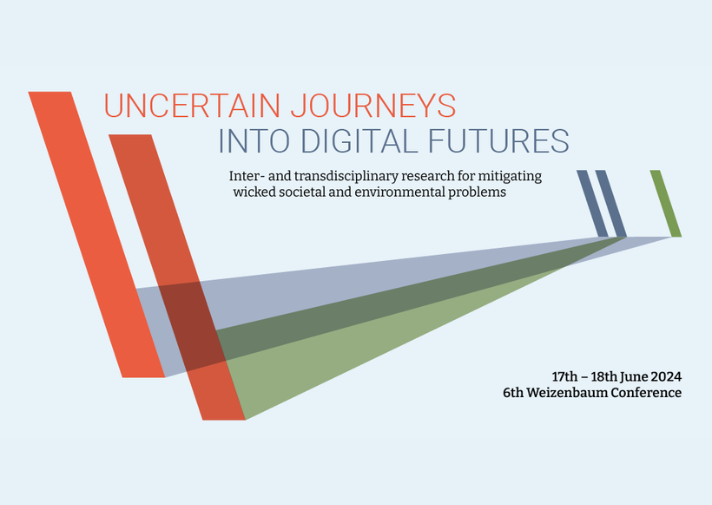
Uncertain journeys into digital futures: Recap of the 6. Weizenbaum-Conference
07/01/2024This year's Weizenbaum Conference focused on the critical question of how to shape a desirable future amidst current and forthcoming challenges and crises. A particular emphasis was placed on the "twin transformation"—the parallel and often interwoven digital and ecological transformation of societies.
The conference was inaugurated by Christoph Neuberger, the Scientific Director of the Weizenbaum Institute. He praised the successful evaluation of the institute by the Science Council and expressed optimism for the future: "We look forward to welcoming you to future Weizenbaum Conferences in the coming years!"
In her address, Federal Minister Bettina Stark-Watzinger highlighted the uncertainties concerning climate change and the geopolitical situation, viewing these not only as threats but also as motivation and opportunity for action. She lauded the guiding values of the Weizenbaum Institute—digital self-determination and sustainability—as crucial orientations in upcoming debates. She also congratulated the institute on its successful evaluation: "You are on your way to the top of international digitalization research!"
Conference Chairs Thomas Kox, André Ullrich, and Herbert Zech shared their thoughts on the conference theme, emphasizing the complexity of so-called "wicked problems" and the inherent uncertainty of the future. Various possible futures were to be explored in numerous engaging lectures, contributions, and presentations from an interdisciplinary perspective.
-
This year's Conference Chairs Thomas Kox, André Ullrich and Herbert Zech
-
Christoph Neuberger opens the conference
-
Federal Minister Stark-Watzinger during her welcoming address
In her keynote address, Francesca Bria outlined the building blocks for a European strategy for a digital economy based on sustainability and human rights. In light of the current polycrisis—triggered by wars, trade wars, migration and climate crises, dependencies on critical raw materials, and geopolitical shifts—she posed the question of the desired society. She advocated for a democratic agenda to protect data, interests, critical processes, and infrastructures, and called for an anti-monopoly economic policy committed to climate neutrality, open-source technologies, intra-European interoperability, and competition.
Numerous contributions presented various aspects of the twin transformation and instruments for shaping desirable futures. Lubna Rashid, Jordana Composto, and Elke Weber investigated the drivers of positive environmental attitudes and behaviors among German workers. Florian Butollo and Ann Katzinski presented initial findings of their project on the impact of generative AI on knowledge work. Paula Scharf and Thomas Bartoschek introduced a mobile, energy-efficient, and affordable system for optimizing bicycle-oriented mobility planning and safety strategies. Tina Comes presented a case study on the behavior of refugees and the provision of vital infrastructures, from which concrete improvement recommendations could be derived. Christian Herzog and Daniela Zetti examined "digital sovereignty" as an "ill-structured problem" (ISP) that can only be resolved processually. Christoph Bieber, Mennatullah Hendawy, Jana Baum, Anouk Cenan, Niklas Frechen, Anne Goldmann, and Pauline Heger analyzed the promise of "smart cities" and dismissed it as impractical.
In the panel discussion "Dimensions of AI Sustainability," Sandra Wachter (Oxford Internet Institute), Jeremias Adams-Prassl (University of Oxford), danah boyd (Microsoft Research & Georgetown), and Brent Mittelstadt (Oxford Internet Institute) discussed under the moderation of Philipp Hacker (European New School of Digital Studies) the various dimensions of sustainable artificial intelligence and its contribution to a socio-ecological transformation. They addressed issues such as ecological exploitation, new geopolitical dependencies, and market concentrations, as well as the risk of subtle inaccuracies in AI systems contaminating collective knowledge.

The second day of the conference began with a keynote by Ina Schieferdecker on "(Un)Certainties of Environmental Change and AI," where she highlighted the certainties and uncertainties regarding climate change and technological development. She emphasized the potential of sustainable, green AI for ecological transformation.
Sigrid Kannengießer argued similarly, noting that we already know enough about the ecological problems of AI to solve them. Florian Meissner, Jan Magnus Nold, Martina Angela Sasse, Rebecca Panskus, and Alexander Wilke presented how the Federal Office for Information Security informs the public about security issues via social media—often inadequately, vaguely, and self-referentially.
Subsequent presentations focused on the notions and imaginations of the future that motivate current actions. Josephine Schmitt analyzed images, drawings, and sketches that people had created about the future. Annemarie Witschas criticized future visions as powerful constructs of industrial actors counteracting a socio-ecological future and proposed a democratic reclamation of the future. Lorenz Erdmann and Simone Kimpeler presented an innovative approach combining "horizon-scanning" with "sensemaking activities" to enable organizations to minimize uncertainties in the twin transformation, eliminate systematic biases in thinking about the future, and facilitate meaningful action.
In the concluding panel discussion, Verena Majuntke (HTW Berlin), Lena Hoffmann (Gesellschaft für Informatik), Felix Kronlage-Dammers (Open Source Business Alliance), and Grischa Beier (Research Institute for Sustainability) discussed ways to make software more efficient and sustainable. The first step is to make these metrics measurable—not only in terms of energy consumption but holistically, considering resource and water usage. More collaboration between European countries is needed for international standards and effective regulation. Open source contributes not only to greater transparency but also enables choices. The panel was moderated by Nikolas Becker (Gesellschaft für Informatik).
Throughout the conference, scientific posters on topics such as digital passivation, smart regions, data donations, and transdisciplinary learning environments were exhibited. Interesting demonstrators such as the senseBox, the Sensorbike, an environmental sensor station, and the simulation game "Plan A" were also on display. The "WeizenRaum" provided an opportunity to learn more about the institute, its staff, and its achievements.
In conclusion, the conference chairs thanked all contributors, reviewers, and the many helping hands from the scientific support staff of the Weizenbaum Institute.



